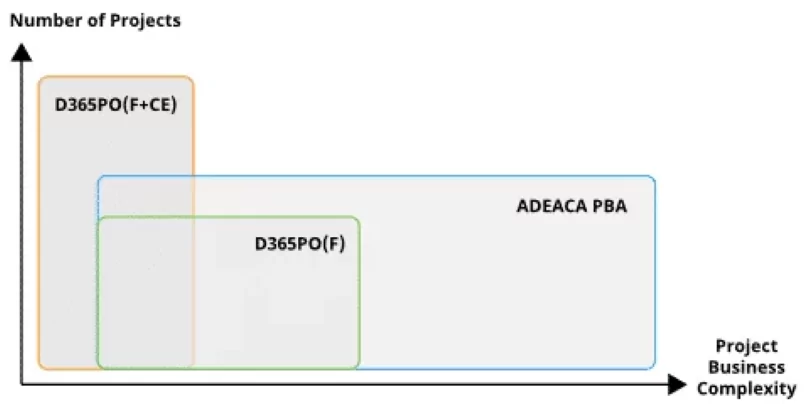Microsoft Dynamics 365 Project Operations (D365PO) is part of a new category of solutions called Project Business Automation (PBA), a term we coined and Forrester now recognizes as the newest paradigm-shifting solution for project-based companies. D365PO provides a base of project capabilities for project-driven organizations.
However, the functionality you receive depends on how D365PO is deployed. And, much like The Matrix, there are major differences in the path you choose. If you choose the blue pill you stick with the functionality found previously in Dynamics 365 Finance ERP and nothing really changes. If you choose the red pill, much of that functionality is migrated over to the Customer Engagement (CE) side of Dynamics and no longer appears in the D365F.
So, the choice is do you stay with the capabilities in D365F, or do you dive-in fully to the D365PO world?
Dynamics 365 Project Operations Deployment Options
Designed to be modular, D365 Project Operations provides customers with different deployment options. D365PO can be deployed primarily in two different configurations that differ significantly in terms of capabilities.
- Blue Pill – D365PO(F): Dynamics 365 Finance only. This option consists of the previously existing project management and accounting module in D365F (ERP). It’s meant for businesses with stronger project accounting and/or integration with supply chain (inventory, MRP, etc.) requirements.
- Red Pill – D365PO(F+CE): Dynamics 365 Finance + Customer Engagement (CE) (Microsoft’s CRM). This option utilizes DE65F for project accounting and billing, and CE for project management. Although the dual write integration helps to synchronize data entities between D365F and CE, some functionality is simplified as it is migrated from D365F to CE. This option is meant for businesses with a stronger need toward managing project sales opportunities and predominantly labor-resource projects (i.e. professional services).
As capabilities that used to reside in D365F are migrated to the CE platform, many are simplified significantly. Based on our analysis, D365PO(F+CE) is designed to the simpler end of project-based companies that are primarily professional services focused.
Meant to serve the growing service-based economy, D365PO has many benefits for this market including an easy-to-use, approachable interface; greater flexibility for the user; enhanced resource management; and higher scalability for companies trying to manage many smaller projects.
However, what D365PO has gained in simplicity it leaves a part of the market unserved.
Download this Whitepaper: Microsoft Dynamics 365 Project Operations vs Adeaca Project Business Automation to gain a detailed understanding of the capabilities of both systems and how your customers can benefit.
D365PO Deployment Depends on Complexity Requirements
Although every organization’s needs are different and there are degrees of complexity, the bottom line is: the simpler your projects in complexity and length, the more suited for D365PO you may be. The more complex your projects are, the more you should seek something like Adeaca PBA.
Please see the graph below to illustrate the differences between the two deployment options as compared to Adeaca PBA. If your company is predominantly professional services based, with relatively simple project business needs, perhaps a high number of smaller projects, D365PO(F+CE) may work well for you. If your company needs some stronger capabilities in project accounting and revenue recognition, the D365PO(F) deployment option may work for you.
However, as your project business complexity grows as does your needs for more sophisticated systems to manage that business, Adeaca PBA can deliver those capabilities. There is a large range of functionality that may be needed for project business.
Complex Projects Need a More Sophisticated Solution
Adeaca PBA provides one comprehensive system that supports the entire value chain for complex project-based companies. If you’re a project-based company, chances are you are employing multiple systems and applications to support project management, project accounting, time and expense reporting, project analytics and more.
That’s a lot of time and resources spent on maintenance and data integration. To top it all off, the result of managing a business through disparate systems is a complete lack of understanding of the current company situation.
When processes are not connected and data is not uniform or integration, mistakes are bound to happen. As a result, important business decisions are delayed or made based in incomplete or inaccurate information, which ultimately leads to poorer outcomes for your customers. That is not how you want to run your project business.
Download the Project Business Automation Blueprint to learn how PBA creates a streamlined, comprehensive system for project-based companies.













